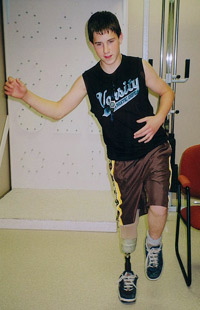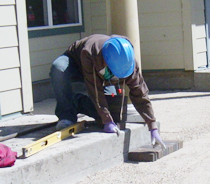Adult services
Overview
F.A.C.T. Occupational Therapy Services provides many services for adults including (but not limited to) General Occupational Therapy Assessments and Treatment Program, Functional Capacity Evaluations, Assessment of Home-making Capacity, Functional Cognitive Capacity, Life Care Planning or Cost of Future Care Assessments, Wrongful Death Claims, Job site Assessments, Ergonomic Consultations, Health Promotion or Injury Prevention Workshops, and Assessment of Driving Capacity. Call us with your specific need or assessment request.
General Occupational Therapy Services
A person's health and well being is influenced by his/her ability to engage in life's occupations, a Functional Assessment of a person’s abilities and limitations in the areas of self-care, productivity and leisure may result in suggestions for adapted techniques and/or equipment to maximize their independence. Additional supports may also be suggested for tasks that are no longer within a person's abilities.
Occupational Therapy Treatment programs are tailored to each individual’s unique needs or problem areas. Services may be carried out in an individual’s home, our clinic or their work places.
Med-Legal
Providing comprehensive consultation & assessment services including Case Coordination, Functional Capacity Evaluations, Loss of Housekeeping Capacity assessments, Wrongful Death Claims evaluations and Future Cost of Care Report (also called Life Care Planning Reports) to the legal community. Sandra qualified as an expert witness in Occupational Therapy for the British Columbia Supreme Court Court in 2006 and the Alberta Court of queen’s Bench in 2011. Occupational Therapists are your experts in defining functional abilities and limitations and costs for future care.
Functional Capacity Evaluations (FCE)
FCE's are a comprehensive evaluation that focuses on major physical tolerance abilities related to the musculoskeletal system. A battery of peer-reviewed tests are used to determine a match between a clients abilities/limitations and the physical demands of their daily occupations.

At F.A.C.T. Occupational Therapy Services, we use the Matheson System. This system defines a hierarchy of the components of safety, reliability, validity, practicality and utility must be considered with all testing. Safety is the primary consideration of all testing and tests may be stopped for safety considerations. A test must be dependable across evaluators and must measure what it is intended to measure. The tasks assigned must have utility and purpose; in other words, the area tested must have a practical purpose and be applicable to the client’s function or activities of daily living. A two day assessment is recommended to enable us to assess the symptomatic response to testing, to compare assessment findings to functional tolerances in their home or work place and/or to conduct repeat testing for consistency.
Along with defining the individuals physical capacity, FCE's can also provide specific information regarding coordination, cognition, perceptual status, physical status, (including range of motion, muscle strength, and sensation) and psychosocial factors all of which may impact one's occupational performance or productivity.
Clinical observation and assessment, using a variety of standardized tests (objective testing protocols) and actual and simulated activities, identifies the clients' physical limitations while keeping in mind his or her medical history and reported limitations. The assessment is tailored to answer the referral question(s).
Life Care Planning (Cost of Future Care)
Illness or injury can present a financial burden to an individual and or their families. A thorough assessment of the associated costs that the injured individual has already incurred or may incur in the future can be determined. Our Life Care Plans are based on published standards of practice for Life Care Planning and will provide rationale and costs for an individual's current and projected services, equipment, therapies and interventions. It is a needs-based approach and will seek maximum independence, prevent functional deterioration and provide replacement services for those tasks the individual is no longer able to do.

Household Productivity
An individual's ability to safely perform homemaking or childcare tasks/activities can be greatly impacted by an injury or chronic illness. An objective assessment is required to determine functional abilities and limitations pre-injury or illness, family composition and roles (including customary division of labour) and the impact of the injury or illness on those roles. Assessment findings may result in recommendations for adaptive aids or labour saving devices, identification of the need for support services or environmental modifications to enable or maximize independence.
Job Analysis/Work Site Assessment
Assessment of a job and/or work site can provide important information regarding the physical demands of the job (i.e. heavy versus sedentary), the physical activities required as well as the psychological demands involved. Recommendations to improve worker safety or modifications to accommodate a worker or to assist in return to work can be obtained from this type of assessment.
Ergonomic Assessment
Poor workstation design can have a large, negative impact on a worker's physical and psychological health. Preventing injuries, reducing absenteeism, increasing comfort and work productivity are but a few of the benefits of an Ergonomic Assessment.
Ergonomics is the science of matching the work to the worker. Assessments in this area are meant to reduce the physical and psychosocial stress a worker may be experiencing whether this is on the job or in a home based office.
Assessments focus on workstation or job design, the work environment and the anthropometrics of the worker and any special needs he or she may have.
In-services can be provided to teach Ergonomic principles and the import role in worker safety and preventing injury in the work place.
Graduated Return-To-Work Programs
Graduated return to work programs assist injured workers by gradually reintroducing them back into the workforce. Working with the employee and the employer, a realistic return-to-work plan is developed and monitored to ensure maximum success in the workplace.

Factors taken into consideration include the employee's abilities and limitations, the physical demands of his/her job and the barriers they may present within the workplace environment. Focusing on the employee's functional ability rather than the impairment will expedite return to work. Recommendations regarding modification of the hours of work or work tasks/duties and provision of ongoing support will assist in providing a positive return-to-work experience.
Strategies to ensure active involvement from the employee and employer in any return-to-work program is critical to the success of the program.
Health Safety Information Management System
F.A.C.T. Services is an authorized licensee of the XILO System. With this state of the art software application, you can store, search, retrieve, update integrate and share information regarding all your health and safety programs. Xilo saves time, money and reduces lost time due to worker injury by integrating Job Demands Analysis and Physical Demands Analysis into effective return to work programs.
Assessment of Driving Capacity
A person's ability to safely drive an automobile can be affected if there is a change in abilities due to illness or disease or through the normal aging process. The decision to suspend someone's driver license has significant social, financial and emotional ramifications for an individual. The need for an appropriate assessment of driving safely is paramount to ensure the safety of all.
At F.A.C.T. Occupational Therapy Services, we conduct a 2-part assessment. The in-clinic portion assesses an individual’s physical and cognitive abilities as they relate to safely operating a motor vehicle. The on-road portion s conducted by a certified driver evaluator and the Occupational Therapist in a dual-brake vehicle. In this portion of the assessment, we examine an individual driving competence, habits and on-road safety. Testing results are shared with Alberta Infrastructure, Driver Fitness and Monitoring.
Cognitive Assessment and Rehabilitation
Changes to one’s cognitive abilities can occur as a result of trauma, illness or disease, as well as age related changes. Regardless of the cause these changes can result in a vast impact on an individual’s day to day functioning. Whether suffering from a traumatic brain injury, post-concussive syndrome, dementia, age related changes, or other cognitive difficulties a cognitive assessment can help to determine an individual’s cognitive strengths and weaknesses. A battery of standardized assessments are administered based on the client’s identified difficulties to measure areas including (but not limited to) orientation, attention, executive functioning, memory, judgement/reasoning, language, visuospatial skills, and information processing. Consultation with a family member or close friend is often sought after in efforts to determine reliability of self-report along with awareness skills. Based on the results of this assessment Occupational Therapists are skilled in developing a client specific rehabilitation program to target ones individualized needs and goals through evidence based treatment strategies and compensatory techniques.
